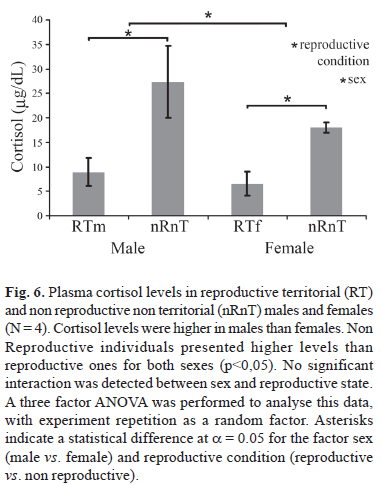In this work we describe for the first time the social and reproductive behavior of the Neotropical fish Cichlasoma dimerus (Heckel, 1840) [Perciformes: Cichlidae], endemic to the Paraná River basin, using a comprehensive-integral approach, including morphological and physiological features. This substrate breeding fish has biparental care of the fry and presents a dominance hierarchy that determines access to breeding territories among males, and to males with territories among females. Gregarious behavior associated with a pale body color, was observed before reproductive behaviors started. Afterwards, a dominance hierarchy was established through aggressive interactions. Territorial individuals had bright body color patterns and non territorial an opaque grey one. Black ventral coloration was associated with reproductive individuals. Courtship displays, which were similar to threatening displays, had the common effect of increasing the visible area of the individual. The dominant male was always the largest one suggesting that size is probably a major factor determining the hierarchy establishment and that these intra-sexually selected traits may have been reinforced by inter-sexual selection. Reproductive males had higher pituitary levels of β-follicle stimulating hormone (β-FSH) and somatolactin (SL) than non reproductive ones, while no differences were found among females. No differences were found among male gonadosomatic indexes. Non reproductive individuals had higher plasma cortisol levels for both sexes. It is possible that dominant reproductive individuals may be inhibiting reproduction of subordinate fish through physical contact, increasing their cortisol levels and diminishing FSH and SL pituitary content. However, this was not reflected as an inhibition at the gonadal level in our experimental design.
Cichlidae; Cortisol; Gonadosomatic index; Gonadotropins; Somatolactin












